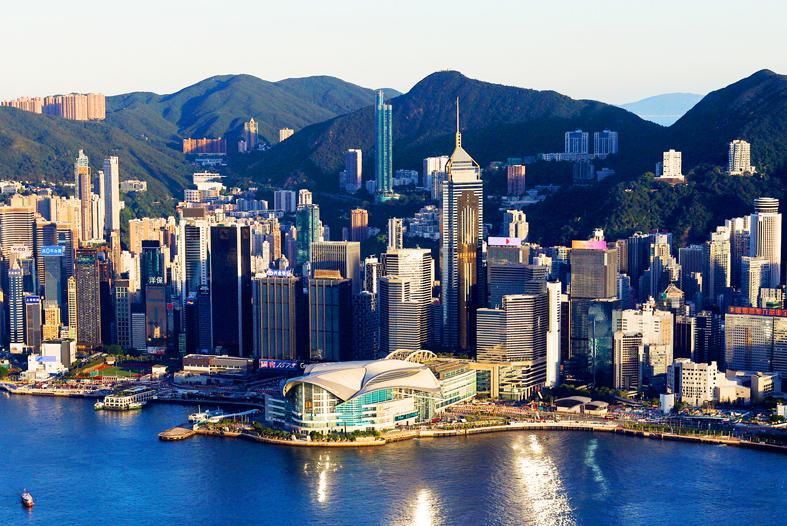Hong Kong police are reportedly investigating the group that organizes an annual protest march marking the territory’s handover to China for possible contravention of the territory’s National Security Law.
Police are gathering evidence and could take action against the Civil Human Rights Front, which holds the July 1 march each year and also organized some of the bigger political protests that roiled the territory in 2019, Hong Kong Police Commissioner Raymond Siu Chak-yee (蕭澤頤) told the Ta Kung Pao daily in an interview published on Friday.
Siu told the newspaper that the group never formally registered with the government nor the police since it was established in 2002.

Photo: Reuters
“Anyone who violates the law, they better not think they can escape,” Siu was quoted as saying.
A spokesperson for the Hong Kong Police Department did not immediately respond to a request for comment.
The group would be the latest target of a sweeping crackdown on dissent that has followed Beijing’s imposition of the National Security Law on the territory last year.
The legislation outlaws secession, subversion, terrorism and foreign collusion, and has been used to arrest more than 100 pro-democracy figures since it was implemented a year ago, as well as the closure of pro-democracy newspaper Apple Daily.
The crackdown has virtually silenced opposition voices in the territory — and drawn sanctions from the US against Hong Kong and Chinese government officials.
The South China Morning Post newspaper on Friday reported that the Civil Human Rights Front had decided to disband, but did not publicly announce the decision.
The group did not respond to requests for comment, while a public e-mail for the group returned an error message.
The group organized massive protests in June 2019 against a since-withdrawn extradition bill that would have allowed suspects in Hong Kong to stand trial in mainland China, where the judicial system is opaque.
Since the National Security Law was enacted, many unions, associations and political organizations have disbanded amid concerns that the law could be used to target them.
The territory’s largest teachers’ union — widely seen as pro-democracy — disbanded earlier this week, citing drastic changes in the political landscape.
Siu said in the interview that the Civil Human Rights Front had held multiple rallies in the past year that possibly contravened the security law, even as authorities previously said that the law was not retroactive.
The organization was previously targeted in a police probe in April over the legality of their operations.
Some of the most prominent members of the Civil Human Rights Front, including former leaders Figo Chan (陳皓桓) and Jimmy Sham (岑子杰), are in jail on charges related to their advocacy.
Chan was convicted of organizing an unauthorized assembly, while Sham has been remanded in custody since March over his involvement in an unofficial primary election last year that the authorities say was part of a plot to paralyze the government.

Intelligence agents have recorded 510,000 instances of “controversial information” being spread online by the Chinese Communist Party (CCP) so far this year, the National Security Bureau (NSB) said in a report yesterday, as it warned of artificial intelligence (AI) being employed to generate destabilizing misinformation. The bureau submitted a written report to the Legislative Yuan in preparation for National Security Bureau Director-General Tsai Ming-yen’s (蔡明彥) appearance before the Foreign Affairs and National Defense Committee today. The CCP has been using cognitive warfare to divide Taiwanese society by commenting on controversial issues such as Taiwan Semiconductor Manufacturing Co’s (TSMC, 台積電) investments in the

INVESTIGATION: The case is the latest instance of a DPP figure being implicated in an espionage network accused of allegedly leaking information to Chinese intelligence Democratic Progressive Party (DPP) member Ho Jen-chieh (何仁傑) was detained and held incommunicado yesterday on suspicion of spying for China during his tenure as assistant to then-minister of foreign affairs Joseph Wu (吳釗燮). The Taipei District Prosecutors’ Office said Ho was implicated during its investigation into alleged spying activities by former Presidential Office consultant Wu Shang-yu (吳尚雨). Prosecutors said there is reason to believe Ho breached the National Security Act (國家安全法) by leaking classified Ministry of Foreign Affairs information to Chinese intelligence. Following interrogation, prosecutors petitioned the Taipei District Court to detain Ho, citing concerns over potential collusion or tampering of evidence. The

‘COMPREHENSIVE PLAN’: Lin Chia-lung said that the government was ready to talk about a variety of issues, including investment in and purchases from the US The National Stabilization Fund (NSF) yesterday announced that it would step in to staunch stock market losses for the ninth time in the nation’s history. An NSF board meeting, originally scheduled for Monday next week, was moved to yesterday after stocks plummeted in the wake of US President Donald Trump’s announcement of 32 percent tariffs on Taiwan on Wednesday last week. Board members voted to support the stock market with the NT$500 billion (US$15.15 billion) fund, with injections of funds to begin as soon as today. The NSF in 2000 injected NT$120 billion to stabilize stocks, the most ever. The lowest amount it

NEGOTIATIONS: Taiwan has good relations with Washington and the outlook for the negotiations looks promising, Minister of Economic Affairs J.W. Kuo said Taiwan’s GDP growth this year is expected to decrease by 0.43 to 1.61 percentage points due to the effects of US tariffs, National Development Council (NDC) Minister Paul Liu (劉鏡清) said at a meeting of the legislature’s Economics Committee in Taipei yesterday, citing a preliminary estimate by a private research institution. Taiwan’s economy would be significantly affected by the 32 percent “reciprocal” tariffs slapped by the US, which took effect yesterday, Liu said, adding that GDP growth could fall below 3 percent and potentially even dip below 2 percent to 1.53 percent this year. The council has commissioned another institution